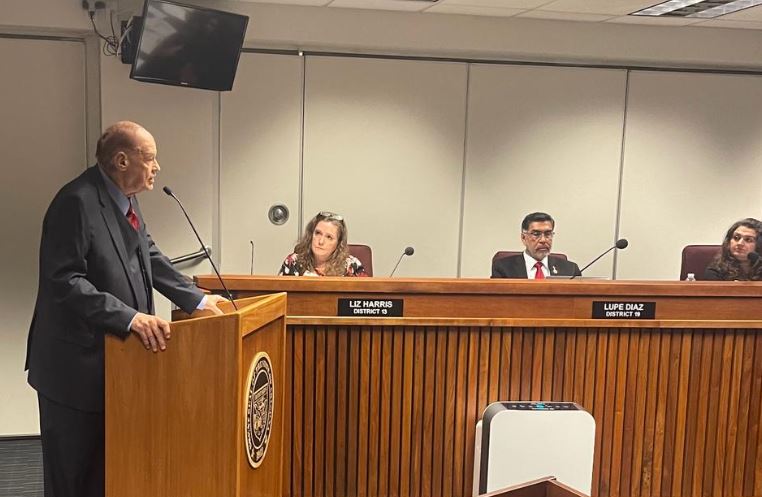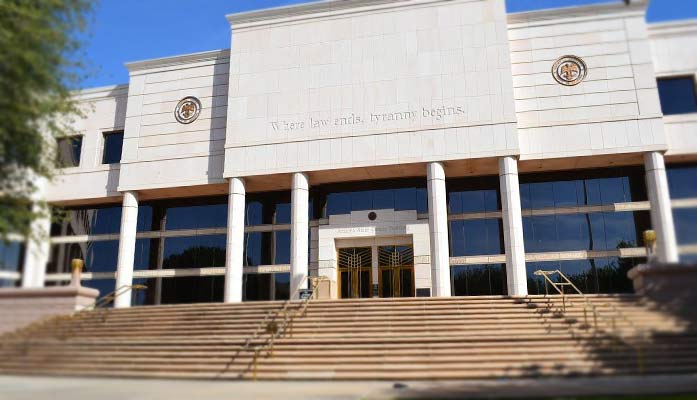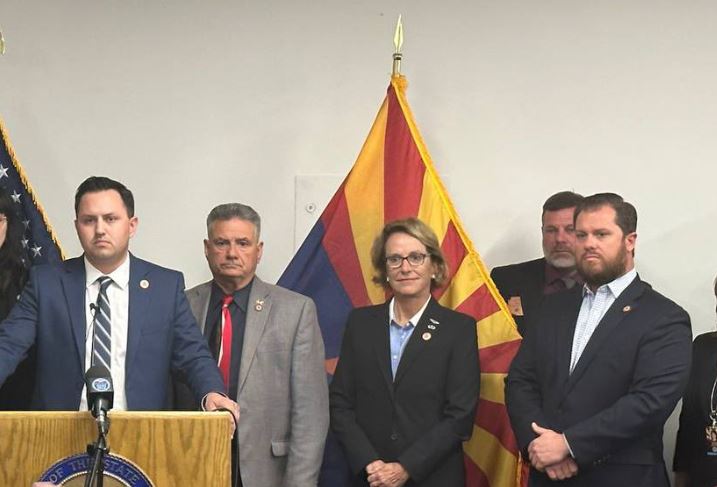
by Daniel Stefanski | Mar 22, 2023 | News
By Daniel Stefanski |
A bill to help Arizona young adults find necessary help is slowly moving through the state legislature, and its sponsor is doing everything he can to push it across the finish line.
HB 2635, sponsored by Representative Travis Grantham, “authorizes a school district governing board to develop or purchase a digital application to assist with threat assessments,” according to the overview provided by the Arizona House. The digital application would allow “students to report safety issues and receive anonymous clinical support that is available at all times,” and provide “resources to students and parents for mental health, bullying and substance misuse issues.”
In an exclusive statement to AZ Free News about why he introduced the bill, Grantham said: “We have a teen mental health problem, a teen suicide problem, and a drug addiction problem amongst our youth. We can’t legislate a good home life or morality but we can try to provide resources and access to resources that can prevent this from taking countless lives.”
In February, HB 2635 passed both the House Education and Rules Committee without a single vote in opposition. House Speaker Ben Toma is the only legislator listed as a co-sponsor.
Yet even with a broad coalition of support through the committee process, there are concerns about this legislation that are slowing its clearance from the full House. Some grassroots groups have registered their concerns about Representative Grantham’s legislation, urging other members to vote against his bill. The Arizona Women of Action wrote, “Contact reps and respectfully demand they vote NO on HB2635. The problem is computer programs trace kids and load info about them without their knowledge. The info can then be synchronized with the child’s phone and computer. Stop data mining and manipulating kids.”
The critique of Grantham’s bill caused him to introduce a floor amendment to his original proposal, changing the focus of the digital application to assistance with “suicide prevention and substance misuse.” The amendment also removed “the requirement that the digital application allow students to report safety issues and receive anonymous clinical support,” and it required “the digital application to provide suicide prevention and substance misuse resources to parents and, subject to parental consent, students.”
Representative Grantham explained that his amendment “put guard rails on the current bill,” and told AZ Free News that “many of his colleagues were concerned that the legislation was too broad and could invite mental health counseling that became even more damaging than the problem itself.” He hopes that this amendment is the catalyst that springs the legislation from his chamber and into the next.
The feedback for HB 2635 hasn’t been all negative. As the bill evolved through committees, Gina Godbehere Thomas tweeted, “Proud to support HB2635 and advocate on behalf of the Teen Mental Health Ad-Hoc Committee. This Bill, which increases access to Mental Health Treatment through a 24/7 app will save lives and make our community safer. Thank you to all those supporting this important first step.”
Katey McPherson, a school digital wellness consultant, also wrote back in February: “The two places my heart lives. Michigan and Arizona. MSU my Alma Mater. They’ve both built me in so many ways. My nephew spent 3 hours in a shelter in place along with 49,999 students. When will it stop? I am behind HB2635 in an effort to be a part of the change. Please join me.”
Daniel Stefanski is a reporter for AZ Free News. You can send him news tips using this link.

by Daniel Stefanski | Mar 21, 2023 | Education, News
By Daniel Stefanski |
A popular and effective program to improve Arizona schools found itself on the wrong side of Democrat Governor Katie Hobbs’ widescale efforts to claw back earmarked funds by her predecessor, but Arizona Republicans are raising awareness and taking corrective action.
Last week, the Arizona Senate Education Committee heard a presentation from Dan Parris of Project Momentum. Parris told the committee that Project Momentum Arizona “was made possible through a unique public/private partnership initiated under former Governor Doug Ducey in 2015,” and that its goals include “increasing student achievement in mathematics and English Language Arts at a rate higher than that of the state and raising performance-based school letter grades.”
According to Parris, “all participating districts (in Project Momentum) have made objective improvements in student achievement outcomes as measurable by the state assessments in English Language Arts and mathematics. Performance growth rates across the project have been two to three times greater than that of the State.” For example, “results from the 2021-2022 school year show the Project supported seven schools with a D or F State rating for performance; and after one year under Project Momentum Arizona, all seven schools earned an A or B rating in the State.”
Parris informed Senators during his presentation that “on February 14, Project Momentum Arizona received notice that ‘the State has determined that the Agreement is not compliant with applicable Arizona law and is, therefore, invalid. Please immediately stop any and all efforts undertaken pursuant to the Agreement.’” This coincides with Governor Hobbs’ February decision to invalidate 19 grants totaling $210 million from former Governor Doug Ducey at the end of his final term as Arizona’s chief executive. In answer to a question from Senate Education Chairman Ken Bennett, Parris said that this project required around $6 million for the fiscal year to accomplish its designs.
The presentation also revealed that “on March 7, districts participating in Project Momentum Arizona received email notice from the Governor’s Office of Grants and Federal Resources that existing grant awards, contingent upon funding, would be continued until August 31. This statement is in compliance with the current binding governing agreements for this school year. Furthermore, participating districts were informed that ‘The Governor’s Office is finalizing a competitive solicitation that will address similar activities as allowed by the U.S. Treasury’s Final Rule for ARPA State and Local Fiscal Recovery Funds. These include remedying student learning loss through provision of professional development and support for teachers and paraprofessionals. Districts will be made aware of this competitive solicitation, application procedures, and the award process in the coming weeks.’”
At the end of the presentation and time for questions, Chairman Bennett reflected on his previous experience in the Senate with then-Governor Janet Napolitano, stating that “one of the things that we are quickly learning – both in the governor’s office and with the legislature – is how to work in a shared government situation.” He hoped that resolving the stoppage in funds to Project Momentum is “one of those things that we ought to work out because it is really helping students in Arizona.”
Earlier this month, the Governor’s Office announced a “redesigned grant opportunity that will designate $100 million for schools and local education agencies in Arizona to address COVID-19 recovery and mitigation efforts.” Additional grant solicitations would follow for another $87.5 million, according to the release.
One prominent Arizona Republican isn’t waiting for Hobbs to correct her funding cut for Project Momentum. The Arizona Department of Education, led by Superintendent of Public Instruction Tom Horne released the following statement Saturday morning, announcing that Project Momentum would soon be receiving funds to resume its worthy operations: “Since its inception, Project Momentum has achieved incredible outcomes, and we were saddened to see its funding cut. Nevertheless, ADE is committed to Project Momentum’s work and is now announcing that it will step up with funds to both facilitate its uninterrupted service and expand to an additional 24 schools.”
Daniel Stefanski is a reporter for AZ Free News. You can send him news tips using this link.

by Daniel Stefanski | Mar 19, 2023 | News
By Daniel Stefanski |
An Arizona Republican’s legislative proposal to enhance protections for pregnant women is meeting resistance from Democrats – and created an interesting exchange in a Senate committee last week.
HB 2427, sponsored by Representative Matt Gress, deals with sentencing standards for domestic violence against pregnant victims. According to the purpose of the bill provided by the State Senate, HB 2427 “classifies, as aggravated assault punishable as a class 3 felony, assault against a pregnant victim if the person knows or has reason to know the victim is pregnant and circumstances exist that classify the offense as domestic violence.”
In January, this legislation passed the House Judiciary Committee with a 5-2 vote (with one Democrat voting ‘present’). It later passed the Arizona House at the end of February with a party-line 31-28 vote (one Democrat not voting). The Arizona House Democrats strongly warned about this bill before it was approved by that chamber, writing, “Bad bills heading to the House floor this morning: Rep. Matt Gress’ attempt to sneak extreme anti-abortion fetal personhood language into domestic violence and child support statutes. Don’t be fooled, HB2502 and HB2427 are about entrenching ideological language into law.”
After voting for the bill, Republican Representative Austin Smith tweeted: “You shouldn’t harm pregnant women. All Democrats voted NO on Matthew Gress’s HB2427.”
Last week, HB 2427 was considered in the Senate Judiciary Committee and led to a noteworthy exchange between a member and a witness. The chairman of this committee, Senator Anthony Kern, asked a witness if men could get pregnant – and received an answer in the affirmative. He then pressed the witness to give her definition of a “woman” but received pushback from the witness and his colleagues on the other side of the aisle for the relevance of that question. The witness finally answered that “there are people who identify as different genders who are capable of getting pregnant” and added that she was not going to “feed into the bigotry of that question.”
The Arizona Senate Republican Caucus wasted no time in responding to what they had heard in the committee, saying: “During testimony given at committee today on HB2427, there seems to be confusion over which gender can have a baby. HB2427 would increase penalties on those guilty of domestic violence against PREGNANT WOMEN. This is the difference between Republicans and Democrats.”
Senator Mitzi Epstein voted no on the bill in the Senate Judiciary Committee and explained that she was against the legislation because she had heard from people who help victims of domestic violence that this bill could “make some victims more hesitant to call for help because it makes the penalties worse for their partners.” She subsequently noted her desire to protect “people” who are vulnerable.
Representatives from the Secular Coalition for Arizona, Arizona Center for Women’s Advancement, NARAL Pro-Choice America, Planned Parenthood Advocates of Arizona, AZ National Organization for Women, and the American Civil Liberties Union of AZ all registered in opposition to HB 2427 during the ongoing legislative process.
Senator Kern had the final word – both in committee and on Twitter, writing: ALERT: The democrat left says men ‘can’ get pregnant, and they ‘cannot’ define what a woman is. TRUTH: Men cannot get pregnant and real MEN protect real WOMEN!”
HB 2427 passed out of the Senate Judiciary Committee with a 4-3 partisan vote, and is expected to be considered by the full chamber in the near future. It is assuredly dead on arrival with Democrat Governor Katie Hobbs should the Senate pass the legislation onto the Ninth Floor of the Arizona Executive Tower.
Daniel Stefanski is a reporter for AZ Free News. You can send him news tips using this link.

by Daniel Stefanski | Mar 17, 2023 | News
By Daniel Stefanski |
Democrat Governor Katie Hobbs’ propensity for politically motivated decisions continues to lead to drawn-out fights with the Republican-led Legislature.
On Wednesday, Republican legislative leaders, Senate President Warren Petersen and House Speaker Ben Toma, filed an amicus brief with the Arizona Supreme Court over the governor’s controversial action to halt the execution of Aaron Brian Gunches.
A press release from the State Senate Republican Caucus stated that “the legislative leaders filed an amicus brief with the Arizona Supreme Court to support the victim’s sister, who submitted a petition for special action last week asking the court to direct the Governor to carry out the warrant issued earlier in the month to execute Gunches.”
In announcing his filing with the state’s high court, President Petersen said, “Right now, victims’ rights protected under the Arizona Constitution are being threatened by the Governor and the Attorney General. It’s incredibly disturbing to see them unwilling to enforce the law and are siding with the most vile individuals convicted of carrying out the most heinous crimes in our state. Furthermore, the Executive Branch is clearly undermining the very foundation of separation of powers by attempting to override the statutory process adopted by the Legislature and affirmed by the Judiciary. This is a dangerous precedent to set by our newly elected Governor.”
The Senate President and the House Speaker argue that “the Governor’s unilateral executive decision threatens bedrock principles of separation of powers by usurping the statutory process established by the Legislature and affirmed by the Judiciary,” that “the decision willfully defies this Court’s mandatory order – signaling to all Arizonans that the Governor is not subject to this Court’s jurisdiction and is, in fact, above the law,” that “the Governor has effectively provided a reprieve of Gunches; death sentence without complying with the statutory limitations on her limited clemency power,” and that “the Governor’s action violates Arizona’s Victim’s Bill of Rights, stripping the victim, Ted Price’s sister, of any finality in this decades-old murder case.”
Senate President Pro Tempore, T.J. Shope, signaled his approval of the court filing, writing, “I agree 100% with President Warren Petersen on this. If we are truly caring less about the victim and their family than the criminal, we are in for years of pain and high crime.”
Petersen and Toma conclude their filing with the following plea for the Arizona Supreme Court to force the state to execute the condemned murderer: “Absent clear and specific delegation of authority from the Legislature or the Judiciary, the Executive cannot rule by fiat and choose which statutes or court orders to follow. The Governor’s actions here set a dangerous precedent, opening a Pandora’s Box and inviting litigation every time she disagrees with a jury’s verdict, a court order, or other statutory mandates passed by the Legislature.”
The saga over Gunches execution started in late-2022, when former Arizona Attorney General Mark Brnovich asked the Arizona Supreme Court for a warrant of execution. After the January 2 transition of power to Katie Hobbs and new Attorney General Kris Mayes, the state desperately attempted to reverse the actions that set Gunches’ execution process into motion. These efforts proved to be unsuccessful, however, when the high court did, in fact, grant the warrant of execution, ordering the state to put Gunches to death on April 6. The governor refused to comply with the court-issued warrant, stating that the State would not be seeking to carry out the execution at this time. Hobbs’ decision triggered court filings from Maricopa County Attorney Rachel Mitchell and Petersen and Toma.
The Arizona Supreme Court is expected to take expedient action in this case with a life and a court-imposed date of execution hanging in the balance.
Daniel Stefanski is a reporter for AZ Free News. You can send him news tips using this link.

by Daniel Stefanski | Mar 16, 2023 | News
By Daniel Stefanski |
As the threat of a Ranked Choice Voting ballot measure grows, Arizona lawmakers are increasing their warnings about the future of elections under this proposed new system.
This week, the Arizona Freedom Caucus released a statement to note its members’ extreme disapproval over the prospects of Ranked Choice Voting governing future elections: “The Arizona Freedom Caucus unequivocally opposes Ranked Choice Voting. The problems with RCV are numerous and well-documented, the least of which is the erosion of the one-citizen, one-vote principle which has long guided American elections. In jurisdictions where it has been tried, RCV has caused the exact outcomes which election integrity legislators have sought to eliminate, such as disenfranchisement, voter confusion, delayed results, and the unnecessary complication of our elections process.”
The Caucus announced its formal support for the passage of HB 2552 and SB 1265.
HB 2552, sponsored by Representative Austin Smith, passed the House on March 1 with a 31-28-1 vote. On February 28, SB 1265, sponsored by Senator Anthony Kern, passed the Senate with a 16-13-1 vote.
Ranked Choice Voting is most prominently featured in Alaska, where voters rank their preferences in each election until one candidate receives more than 50% of the vote. If RCV were to be successfully pushed by special interest groups in the 2024 election, Arizona’s primary and general elections would be effectively eliminated in favor of this new progressive system.
According to the Pew Research Center, “62 jurisdictions nationwide have adopted the voting method” – and more are on the way in the near future, including the attempt to airdrop it into Arizona.
Representative Smith issued the following statement in the Arizona Freedom Caucus’s press release: “Ranked Choice Voting is an unmitigated disaster as seen recently in Alaska and local municipalities races. Arizona—Maricopa County specifically—already has a bad record of voter tabulation and counting process. Between voter confusion, high rates of ballot exhaustion and the difficulty of tabulating the results, RCV increases voter disenfranchisement, distrust in the process and deters candidates from taking stances on issues important to every Arizonan. The bottom line is RCV is a scam that destroys integrity in elections.”
Senator Kern also provided a quote for the release, saying, “RCV may not always result in the candidate with the most first-choice votes winning the election. I am aware that there are groups in Arizona advocating for RCV, but this will only lead to chaos, and we must ensure that our constituents have easy and fair access to the ballot box.”
Another Freedom Caucus member, Senator Justine Wadsack, also weighed in on the Ranked Choice Voting debate: “RCV introduces voter disenfranchisement perpetrated by its ‘exhausted ballots’ because the effect is the silencing of significant portions of the electorate. Exhausted ballots are those that do not rank any continuing candidate, contain an overvote at the highest continuing ranking, or contain two or more sequential skipped rankings before its highest continuing ranking.”
The Arizona Freedom Caucus, along with other Republican members of the State Senate and House, hosted a press conference on Wednesday, at 11:00am, in the Senate Appropriations Committee Hearing Room to announce their formal opposition to Ranked Choice Voting. These efforts take place under the unfriendly shadow of the Ninth Floor of the Arizona Executive Tower, where the legislation has little chance of being signed into law by Democrat Governor Katie Hobbs.
Daniel Stefanski is a reporter for AZ Free News. You can send him news tips using this link.





